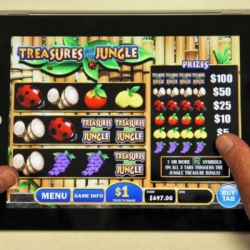Electronic pull-tab gaming was supposed to provide the state of Minnesota a significant chunk of the funding for the new Vikings Stadium. Instead, it has been a major disappointment to Minnesota lawmakers, regulators, and gaming executives.
A pull tab is a gaming ticket with a perforated tab. When this tab is pulled, a player hopes to match the revealed symbols with the stated winning symbols. In certain states and regions, pull tabs are the equivalent of lottery scratch cards.The major difference is that the prizes are limited to a maximum amount, while charities often use pull tab contests to raise funds.
Twenty U.S. states have legal pull-tab games, including Minnesota and Pennsylvania. An electronic pull tab machine is a device which simulates the pull tab lotto experience with a random number generator and virtual graphics. Such machines have been used since 1990, and have grown in prevalence over the years. It was assumed by Minnesota’s leaders that, if pull-tab gaming was popular, then electronic pull-tabs would be just as popular. That hasn’t been the case.
Express Games and Acres 4.0 No Longer Involves
On the heels of two major announcements in the past week, the e-pull tab operation will undergo major changes. Express Games MN, the largest provider of electronic pull tab games to bars and establishments throughout Minnesota, said it will stop operations on July 31. Little to no explanation has been offered by Express Games MN so far.
Meanwhile, Acres 4.0 has announced it will sell the e-gambling device system used to power the devices. Acres 4.0 is a Las Vegas firm, but it released the first e-gambling devices in Minnesota. Therefore, the entire way pull-tab games are distributed and marketed in Minnesota appears ready to change.
Pilot Games Likely to Fill the Void
The most likely successor to Express Games is Pilot Games, a firm headed by former Express Games founder, Jon Weaver. According to those on the ground in Minnesota, charities which have used the Express Games e-pulltabs are being encouraged to switch to Pilot Games.
It is uncertain how lucrative such a switch would be for the charities or Pilot Games. The industry has cratered over the past two years and many gambling experts suggest it would be hard to ignite interest in the e-pulltab machines once again.
Jon Weaver Is Optimistic
Despite that prognosis, Jon Weaver has expressed optimism that his new business model will meet or exceed expectations. It certainly helps that expectations this time around are so low.
Of course, Jon Weaver was the man making promises two years ago when Express Games took control of the industry. Perhaps he learned his lessons and is ready to deliver improved service. Perhaps Weaver’s successors made mistakes and he’s convinced officials he will rectify those oversights.
History of Minnesota E-Pull Tab Machines
Express Games launched the first e-pulltab games on September 18, 2012. At the time, the games were expected to become a steady revenue stream for the building of a new Vikings Stadium, which is expected to cost $975 million. The state of Minnesota will pay $348 million, the Vikings will pay $477 million, and a hospitality tax will pay the remaining $150 million.
New Vikings Stadium
The Vikings Stadium is set to open in 2016. The NFL awarded the stadium hosting rights for the 2018 Super Bowl. Such decisions are common with new stadiums around the National Football League, because the hotel and entertainment revenues bring in hundreds of millions of dollars in revenue to the local economy, which helps pay for the upfront costs of building a billion-dollar stadium.
The process has been more complicated than officials would have hoped. Earlier this year, a lawsuit by Minneapolis mayoral candidate Doug Mann delayed plans for $468 million bond sale. The Minnesota Supreme Court eventually dismissed the case, but there were worries the case could delay completion and increase the final price.
Budget Shortfall on Stadium Construction
The shortfall on the lawful gambling revenues caused the Minnesota legislature to take counter-measures. To make up the shortfall for the last year, the legislature imposed an inventory tax on cigarettes, while it had to close a loophole on a corporate income-tax. Such measures raised taxes on two key groups: average Minnesota residents and Minnesota’s corporations.
When such measures are imposed, the politicians are not going to be happy. This likely accounts for the shakeup in the e-pulltab gaming industry. While the lawmakers made up the shortfall for 2013, they don’t want to have to make a habit of increasing taxes on their voters and political donors. Raising taxes is generally the quickest way for office holders to lose their reelection bids.

